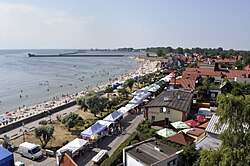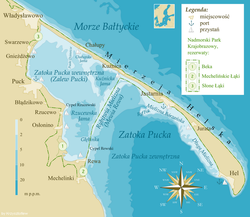Hel, Poland
| Hel | |||
|---|---|---|---|

View of Hel
|
|||
|
|||
 |
|||
| Coordinates: 54°36′42″N 18°48′29″E / 54.61167°N 18.80806°E | |||
| Country |
|
||
| Voivodeship | Pomeranian | ||
| County | Puck | ||
| Gmina | Hel (urban gmina) | ||
| Established | 12th century | ||
| Town rights | 1351-1872, 1963 | ||
| Government | |||
| • Mayor | Mirosław Wądołowski | ||
| Area | |||
| • Total | 21.27 km2 (8.21 sq mi) | ||
| Population (2006) | |||
| • Total | 3,898 | ||
| • Density | 180/km2 (470/sq mi) | ||
| Time zone | CET (UTC+1) | ||
| • Summer (DST) | CEST (UTC+2) | ||
| Postal code | 84-150 | ||
| Area code(s) | +48 58 | ||
| Car plates | GPU | ||
| Website | http://www.hel.eu/ | ||
Hel [xɛl] (Kashubian Hél, German Hela) is a town in Puck County, Pomeranian Voivodeship, Poland, located on the tip of the Hel Peninsula, some 33 kilometres (21 miles) from the Polish mainland.
The Kashubian village of Hel was first mentioned in 1198 as a centre of herring trade area named Gellen. In one of the Danish chronicles of 1219 it is mentioned that a damaged ship of King Valdemar II the Victorious was set ashore on an "Island of Hel". By 13th century the village became one of the most important trade centres of the area, competing with the nearby town of Gdańsk (German: Danzig). It was then that the village was granted city rights by Duke Świętopełk II the Great of Pomerania. The privileges were later confirmed in 1378 when the town came under the rule of the Teutonic Knights.
Initially the town was located some 1.5 km (1 mi) from its present-day centre. It contained a church, hospital, city house, two market places, several guest houses and a small port. However, during the 15th century the peninsula started to shrink through marine erosion and soon the town was relocated to a safer location. In 1417 St Peter's Church was built in the town, devoted to the patron saint of fishermen. Hel experienced a period of growth, but was later left behind by the faster-growing city of Gdańsk. In 1466 King Casimir IV of Poland granted the town as a fief to the rulers of Gdańsk, which ended the century-long struggle for economical domination over the Gdańsk Bay. In 1526 King Sigismund I the Old withdrew all privileges previously granted to Hel and sold the town and the peninsula to the city authorities of Gdańsk. Since then Hel's fate was tied to the fortunes of its bigger neighbour.
...
Wikipedia



